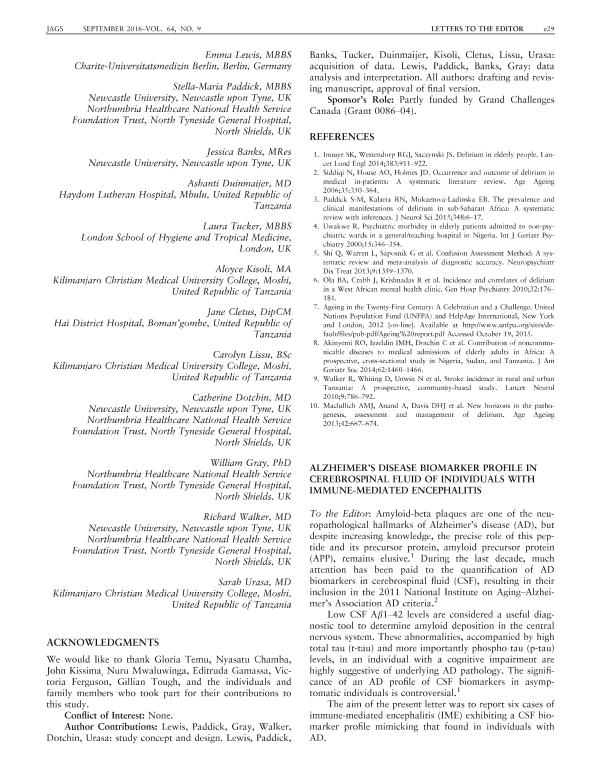Artículo
Alzheimer's Disease Biomarker Profile in Cerebrospinal Fluid of Individuals With Immune-Mediated Encephalitis
Fernández Suárez, Marcos Nicolás; Surace, Ezequiel Ignacio ; Riudavets, Miguel Angel; Nogues, Martin; Vazquez, Silvia; Sevlever, Gustavo; Allegri, Ricardo Francisco
; Riudavets, Miguel Angel; Nogues, Martin; Vazquez, Silvia; Sevlever, Gustavo; Allegri, Ricardo Francisco
 ; Riudavets, Miguel Angel; Nogues, Martin; Vazquez, Silvia; Sevlever, Gustavo; Allegri, Ricardo Francisco
; Riudavets, Miguel Angel; Nogues, Martin; Vazquez, Silvia; Sevlever, Gustavo; Allegri, Ricardo Francisco
Fecha de publicación:
06/2016
Editorial:
American Geriatrics Society
Revista:
Journal of the American Geriatrics Society
ISSN:
1532-5415
Idioma:
Inglés
Tipo de recurso:
Artículo publicado
Clasificación temática:
Resumen
All of these individuals had rapid onset of dementia,with cognitive fluctuation, neuropsychiatric symptoms, andseizures. The individuals underwent brain magnetic resonance imaging (MRI), CSF analysis, and tumor screening.An antibody panel performed on CSF from two of theseindividuals was positive for voltage-gated potassium channel antibodies. All had almost complete clinical recoveryafter treatment with methylprednisolone or plasmapheresis. None had any evidence of malignancy at follow-up.CSF biomarker levels were compared with those of 13individuals with a diagnosis of probable AD and 15 controls without dementia from the Argentine Alzheimer?sDisease Neuroimaging Initiative3 cohort.Ab42, t-tau, and p-tau CSF biomarkers were measuredusing commercially available enayme-linked immunosorbent assays (Innotest b- amyloid(1?42), Innotest hTAU-Agand Innotest Phosphotau(181P), respectively; Innogenetics,Ghent, Belgium).CSF t-tau levels in individuals with IME were higherthan in individuals without dementia, which strongly suggests underlying neuronal damage. P-tau was just slightlyhigher; Ab1?42 levels were low in all six cases (even lowerthan in individuals with AD) (Table 1).Case 1 underwent three lumbar punctures (at onsetand 2 and 12 months after treatment with intravenouscorticosteroids and mycophenolate mofetil). CSF biomarker levels showed higher Ab1?42 levels than in controlsand low t-tau and p-tau. These molecular findings correlated with improvement in cognitive functionCase 1 also underwent positron emission tomographywith Pittsburgh compound B (PiB-PET), which was negative for Ab1?42 deposition. Case 4 underwent brainbiopsy, which was negative for Ab immune labeling andshowed no evidence of AD neuropathology.This is the first report, to the knowledge of theauthors, on individuals with IME with a CSF biomarkerprofile mimicking that observed in individuals with AD.It has been generally accepted that low CSF Ab1?42levels indicate amyloid deposition in the central nervoussystem, but the same results were found in this group ofsix individuals with IME. The CSF biomarker levels ofCase 1 showed significant fluctuation after treatment(normalization of Ab1?42 levels and decrease in t-tauand p-tau), with a concomitant improvement in cognitivefunction. In addition, in two of the six individuals, Ab1?42 brain accumulation was excluded using a secondmethod (PiB-PET and neuropathology). These findingssuggest the possibility that APP metabolism may bealtered in individuals with IME. In this regard, APPcleavage by beta- and gamma-secretases may be alteredin a way that results in low Ab1?42 production. Also, itis possible to envision a scenario in which Ab1?42 clearance, by proteases or through the blood?brain barrier, isincreased.AD biomarkers have been assessed in previous studiesof individuals with multiple sclerosis and neuromyelitisoptica, with contradictory findings. Most studies showedno differences between controls and individuals with thedisease.4 In the case of human immunodeficiency virus?related cognitive decline, lower CSF Ab1?42 with lowertau and p-tau181 than in controls has been described.5 Asin individuals with AD, Ab1?42 was low in individualswith CNS infections, suggesting an effect of neuroinflammation on amyloid metabolism.6In conclusion, an AD-compatible CSF biomarker profile in individuals with rapid cognitive decline must becarefully interpreted to determine whether an immunemediated disorder is involved. Also, the use of AD CSFbiomarkers in individuals with cognitive disorders withacute onset is discouraged. A more-extensive evaluation ofCSF biomarkers in individuals with IME is warranted tovalidate these findings.
Palabras clave:
ALZHEIMER
,
CSF
,
IMMUNE MEDIATED ENCEFHALITIS
,
BIOMARKERS
Archivos asociados
Licencia
Identificadores
Colecciones
Articulos(SEDE CENTRAL)
Articulos de SEDE CENTRAL
Articulos de SEDE CENTRAL
Citación
Fernández Suárez, Marcos Nicolás; Surace, Ezequiel Ignacio; Riudavets, Miguel Angel; Nogues, Martin; Vazquez, Silvia; et al.; Alzheimer's Disease Biomarker Profile in Cerebrospinal Fluid of Individuals With Immune-Mediated Encephalitis; American Geriatrics Society; Journal of the American Geriatrics Society; 64; 9; 6-2016; 29-31
Compartir
Altmétricas



